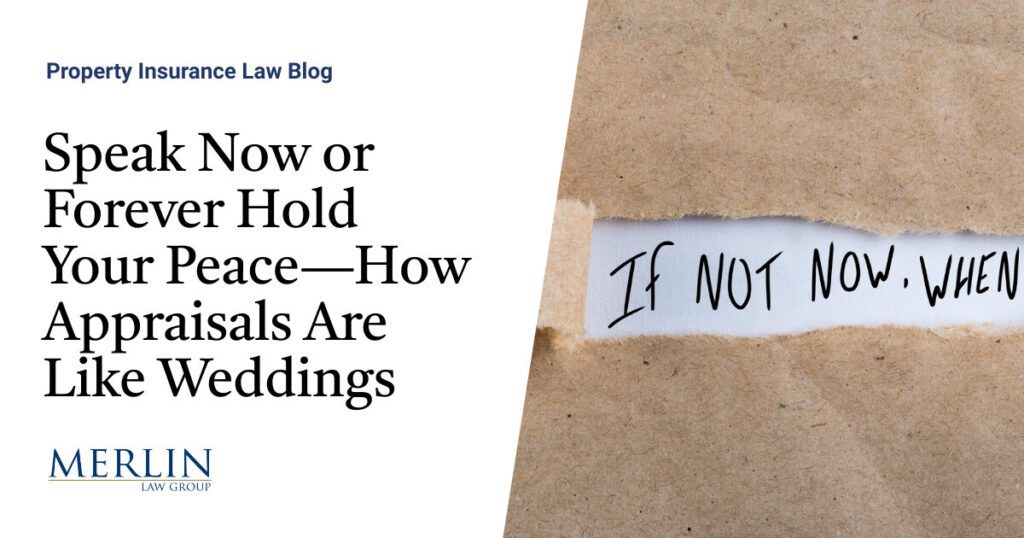Speak Now or Forever Hold Your Peace—How Appraisals Are Like Weddings

The phrase “speak now or forever hold your peace” is a traditional element at many wedding ceremonies. When the minister asks if anyone has objections to the marriage, it is an invitation for attendees to voice any legal or moral objections to the union before it is finalized. I always look around to see if somebody is crazy enough to ruin a wedding. So far, that has not happened—but I know a lot of people at weddings who were biting their lips.
The practice dates back to medieval times when communication between distant communities was limited. To prevent issues like bigamy, Christian churches introduced the practice of announcing marriage banns. These banns were proclamations made on three consecutive Sundays before the wedding, giving the community a chance to raise any objections, such as an existing marriage or other legal impediments. The phrase “speak now or forever hold your peace” was a final opportunity during the ceremony itself for anyone to voice such concerns. 1
I was thinking about one wedding in which half of us should have made an objection while reading an appraisal decision where the same concept about timely objecting to the bias and unfitness of an appraiser was the primary issue. 2 The court stated the facts and its ruling in the very first part of its decision:
Westchester issued a property-insurance policy to Biscayne Beach, which demanded appraisal of a loss that storms inflicted on its property. The district court abated Biscayne Beach’s action, and the parties retained their appraisers, who then selected an umpire to complete the panel. The day the panel met for final negotiations, Biscayne Beach’s appraiser disclosed for the first time—15 months after his retention—that he thought he had a financial stake in the award on account of a contingency-fee retainer. Westchester did not object, and the panel issued its award over a month later. Westchester later moved to reopen the action and to vacate the award on the ground that the appraiser had acted partially. The district court denied the motion—in part because it ruled that Westchester had waived any objection to the appraiser’s partiality by not objecting sooner—and confirmed the award. We affirm because Westchester waived its objection to the appraiser’s partiality.
The rule and lesson of this post is that when a party to an appraisal first learns an appraiser is unfit, unqualified or biased—-“speak now or forever hold your peace.”
The court’s analysis explained its reasons for this rule:
Westchester had its chance to challenge Pyka’s partiality, chose to wait and see how the appraisal turned out, and now asks the court to restart the process—all while claiming that it would be wasteful to have objected any earlier. Westchester ‘waived the right to object’ to Pyka’s partiality by not objecting ‘at th[e] time’ he disclosed it.
Those studying appraisal law should note that the decision referred to arbitration and often called the panel members “arbitrators.” It further relied upon arbitration law for its determination. As expressed in my recent post, Appraisal Orders Setting Criteria to be an Appraiser, Procedure for Determining Umpire, Discovery During Appraisal, and Details of the Appraisal Award, the trend is for federal judges to apply the Federal Arbitration Act to the process of appraisal. Indeed, it begs the question if they view the process as an arbitration or an alternative to arbitration.
Thought For The Day
Before you marry a person, you should first make them use a computer with slow internet to see who they really are.
—Will Ferrell
1 Sarah Zlotnick. The History Behind “Speak Now or Forever Hold Your Peace,” Brides. Sept. 29, 2023. Available online at https://www.brides.com/speak-now-or-forever-hold-your-peace-5100968
2 Biscayne Beach Club Condo. Assoc. v. Westchester Surplus Lines Ins. Co., No. 23-10467, 2024 WL 365984 (11th Cir. Aug. 6, 2024).



